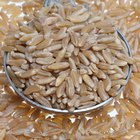
Purestock/Purestock/Getty Images
The Genesis diet is also known as the Hallelujah diet and follows a vegan eating pattern. It is based on verse 1:29 in the book of Genesis that quotes God as saying, “Behold, I have given you every herb bearing seed, which is upon the face of all the earth, and every tree, in the which is the fruit of a tree yielding seed; to you it shall be for meat.” While some people report weight loss and health success with this diet in the short term, those who follow it long term commonly develop health problems and nutrient deficiencies.
Diet
To follow the Genesis diet, eat 85 percent raw foods and 15 percent cooked foods. Strictly followed you should consume the following foods as a percentage of your total caloric intake. Eat 28 percent raw vegetables, 21 percent fruit, 12.3 percent fresh vegetable juice, 10 percent cooked vegetables, 9.6 percent green barley powder, 7.3 percent raw nuts and seeds, and 5.7 percent bread and cooked grains. Flax and olive oil, along with beans and honey, should make up 6.1 percent of your diet.
Nutrition Deficiencies
The Genesis diet does not produce a balanced diet for most people when followed long term, according to a research paper by Michael Donaldson, Ph.D., the head of Hallelujah Acres Foundation. The study analyzed dietary and health information gathered on 141 people following the Genesis diet. Out of 87 women, all were deficient in calcium, 84 were deficient in vitamin B-12, 64 were deficient in selenium, 56 were deficient in biotin, and 49 were deficient in zinc. Out of 54 men, 52 were deficient in calcium, 50 were deficient in vitamin B-12, 18 were deficient in selenium, 14 were deficient in biotin, and 39 had a zinc deficiency. Other deficient nutrients for both groups were pantothenic acid, niacin and iron.
Long-Term Mental Symptoms
Some people who follow the Genesis diet for the long term experience a number of symptoms related to emotional stability and mental capacity. More than half the people reported scattered thinking, memory loss and a low tolerance to stress. At least 40 percent reported negative thoughts, mood swings, grouchy behavior and depression. Almost 40 percent reported being unable to concentrate and 11 percent reported panic attacks and paranoia.
Long Term Physical Symptoms
Some people who follow the Genesis diet long term experience a number of physical symptoms due to nutrient deficiencies. According to Donaldson’s research, more than half the people surveyed lost muscle mass and had brittle or thin fingernails. More than 40 percent had pale skin, dull eyes, slumping posture and hair loss. More than 30 percent had dry or burning eyes and headaches, neck aches and shoulder pain. More than 20 percent experienced heart palpitations and tooth decay. Sixteen percent had bleeding gums.
Related Articles

Symptoms of Adult Survivors of Child ...

Nutrition Information on Blueberries

Asian Secret to Removing Cellulite

What Foods Provide Calcium D-Glucarate?

A List of Foods That Contain Choline

Kamut Nutrition

Can You Change Skin Tone with Food?

Difference in Sugar Content of Sweet ...

Which Vegetables Produce the Most ...

Skin Benefits of Eating Coconut Oil

Is Zinc Good for Hair Growth?

The History of Butternut Squash

Can I Exercise on the Master Cleanse ...

What Is a First-Degree Relative?

The Mayan Diet

Carbohydrates in Zucchini

What Is the Nutritional Value of an ...

How to Make Sacred Heart Diet Soup

How to Cook Canned Yams in a Slow Cooker

A Low-Cholesterol Diet Plan Menu
Resources
Writer Bio
Victoria Weinblatt began writing articles in 2007, contributing to The Huffington Post and other websites. She is a certified yoga instructor, group fitness instructor and massage therapist. Weinblatt received her B.S. in natural resources from Michigan State University and an M.Ed. from Shenandoah University.
Photo Credits
Purestock/Purestock/Getty Images